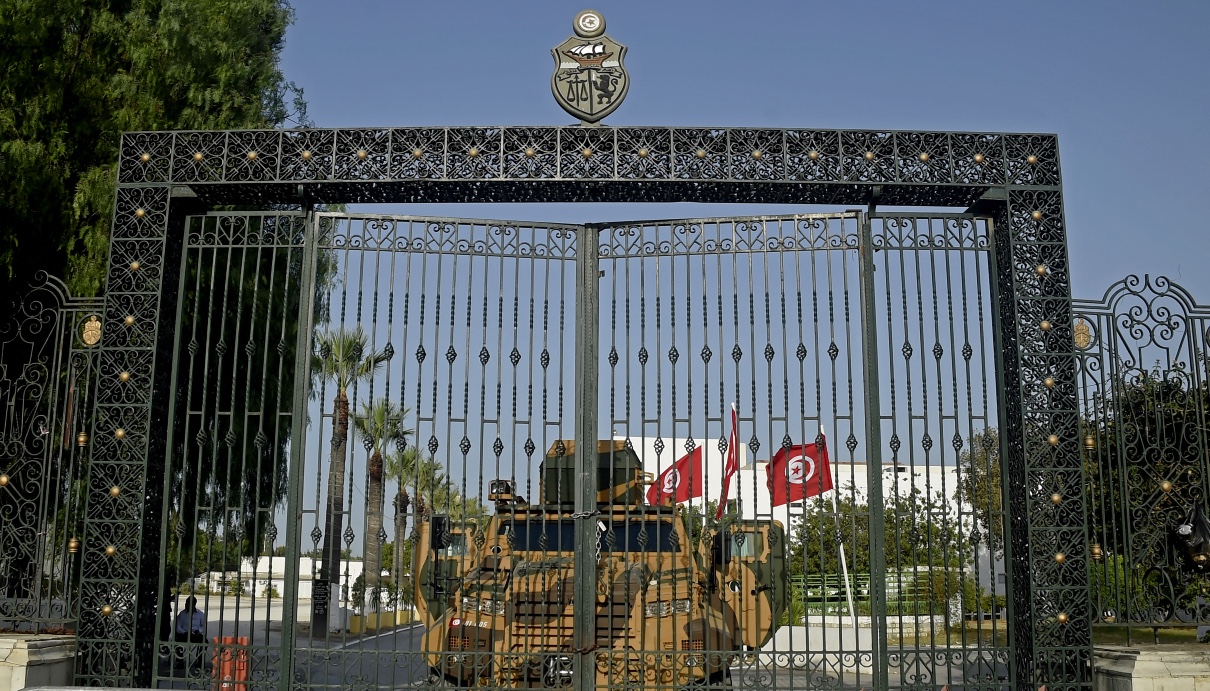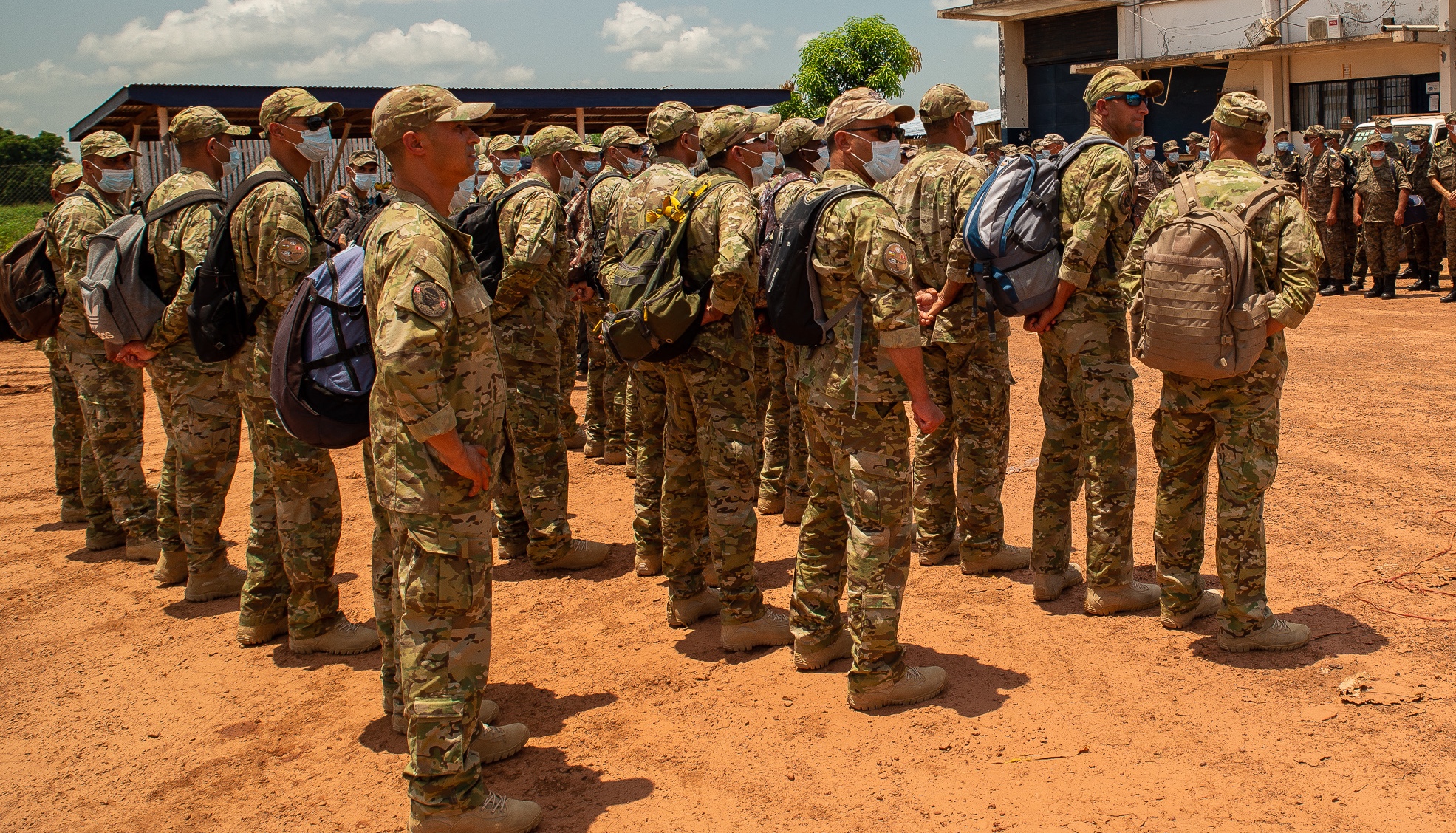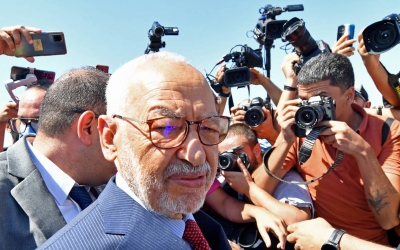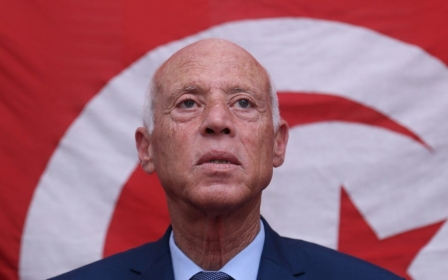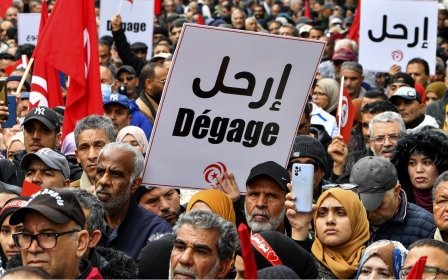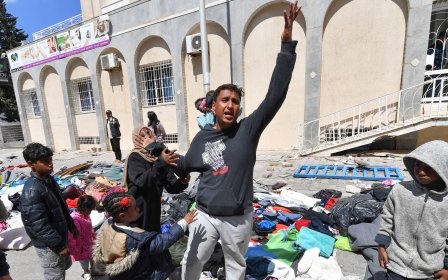How Tunisia’s defence ties with US endure despite aid cuts
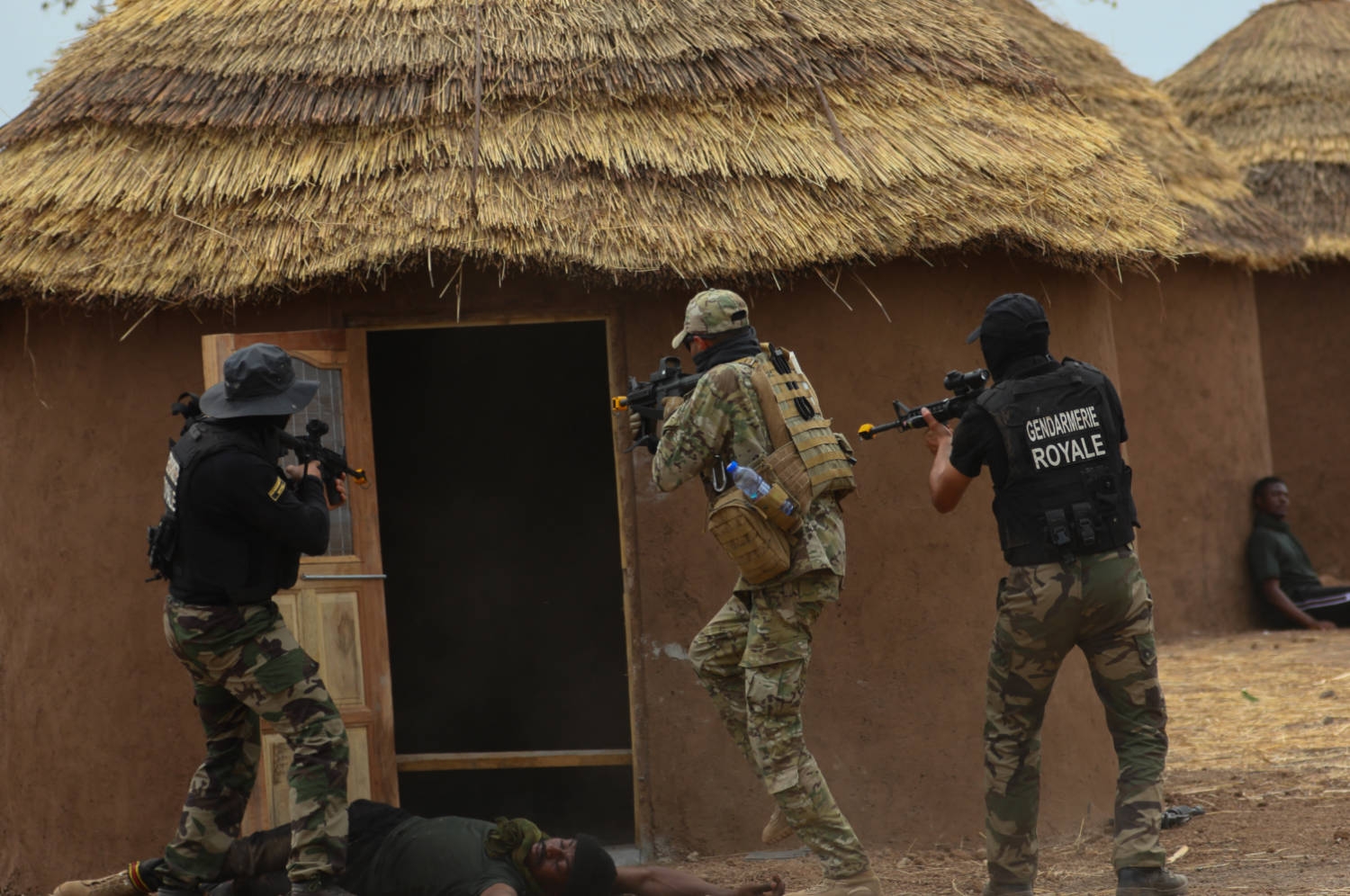
A quiet corner of the United States' military partnership with Tunisia is “growing”, as the North African country’s democracy unravels and its economy suffers.
In May, the Wyoming National Guard's 133rd Engineer Company will travel to Tunisia to help build firing ranges and a counter-IED (Improvised Explosive Device) training facility. The month after, Tunisian troops will participate in military exercises hosted by US Northern Command in Wyoming.
“The relationship is absolutely growing,” Brigadier General David Pritchett, director of joint staff at the Wyoming National Guard, told Middle East Eye. “We are enhancing cooperation.”
The ties between Tunisia and Wyoming go back to 2004, when they partnered in a federal programme linking foreign militaries with state national guard units.
Last year, Wyoming’s national guard sent non-commissioned officers (NCO) to a workshop in Tunisia. The aim was to improve their counterpart's ability to think on their feet and make quick decisions. US officials have credited similar training of high-ranking, enlisted troops with turning Ukraine’s once Soviet-style military into a more effective modern fighting force.
New MEE newsletter: Jerusalem Dispatch
Sign up to get the latest insights and analysis on Israel-Palestine, alongside Turkey Unpacked and other MEE newsletters
“It’s the same playback California’s national guard used with Ukraine, which was a very top-down military,” Pritchett told MEE. “A professionalised NCO corp has been pivotal to Ukraine successfully fighting Russia.”
Of course, the partnership with Tunisia plays out against the backdrop of an authoritarian crackdown by President Kais Saied that has imperiled one of the only democracies to emerge from the 2011 Arab Spring protests.
In 2021, the democratically elected Saied shuttered parliament. He replaced it with a rubber-stamp assembly and rewrote the constitution to consolidate power. He has since launched a wave of arrests targeting journalists, activists and political opponents.
The Biden administration has oscillated between scolding and engaging Saied. It has cut aid to Tunis. The State Department’s 2024 budget request called for a roughly 70 percent drop in economic support from $45m to $14.5m.
US military assistance fell sharply the year after Saied’s power grab, but it has held up since then.
The State Department requested $45m for Tunisia’s 2024 Foreign Military Financing (FMF), funds used to purchase American weapons, the same as last year. Smaller cuts have been requested for anti-terrorism and counternarcotics programmes.
'If Tunisia implodes, there needs to be adults in the room to talk with'
- Western diplomat
Tunisia’s relationship with the Wyoming National Guard underlines just how sticky and multifaceted security ties can be - and also how they extend beyond price tags.
The partnership programme’s annual budget for all 95 participating countries is just $40m - small fry in the big world of US defence spending, but highly valued, analysts say.
“Engagement can be more important than the funds,” Sharan Grewal, an expert on Tunisia’s military at the Brookings Institution, told MEE. “Tunis could turn to Russia or China to make up for the $30m or $40m budget shortfall.”
William Lawrence, a former US diplomat in Tunisia, told MEE that Tunisian officers value American training even more than French training. "They understand no one compares with the US military."
"Things like joint training and trips to the US are, in part, a reward for good behaviour. It's part of how the military keeps up morale and loyalty. Cooperating with the US bestows the army with legitimacy," he said.
The relationship between the Tunisian and US militaries goes back to the Cold War. Unlike in neighbouring Algeria or Egypt, the military didn’t play a dominant role in Tunisia’s post-colonial history.
Tunisia’s first President, Habib Bourguiba, and later ruler, Zine El Abidine Ben Ali, distrusted the military. They enfeebled it in favour of the security services and national guard.
Diplomats and analysts credit the army’s refusal to follow Ben Ali’s orders to shoot at protesters in 2011 as one of the reasons Tunisia avoided the chaos that befell other states following the Arab Spring.
And as Tunisia’s democracy took root, the military benefited.
Its expenditure ballooned from $572m in 2010 to $1bn in 2016. The US funded civil society in Tunisia but at the same time sought to draw the military closer. In 2015, it was designated a major non-Nato ally, a decision that unlocks access to superior US weapons systems and training.
A wave of terror attacks in the following years led to even greater cooperation. In 2017, US Marines fought alongside the Tunisian army against al-Qaeda militants near the country’s border with Algeria, though both governments downplayed their joint activities.
'The Tunisian military has begun training sub-Saharan African militaries. We are now training the trainers'
- Sharan Grewal, Brookings Institution
The US’s shift to combating militants in the Sahel and West Africa has placed new responsibilities on Tunisia and comes as Washington looks to check Russia’s growing security footprint in Tunis’ southern neighbourhood.
“The Tunisian military has begun training sub-Saharan African militaries. We are now training the trainers. That has made Tunisia more important as a strategic partner,” Grewal, from the Brookings Institution, told MEE.
In March, Tunisian special forces took part in US-led military exercises, called Flintlock, in Ghana and Côte d’Ivoire. Along with Ghana, Senegal, Djibouti and Morocco, Tunisia will host the Africa Lion military exercises later this summer, one of the US’s biggest projections of military might on the continent.
Brigadier General Pritchett’s Wyoming National Guard trains with the Tunisian military on Blackhawk helicopters and C-130 transport aircraft. He says it’s a mutually beneficial partnership. “We learn just as much from them as they learn from us,” he told MEE.
But critics say after nearly a decade of engagement with the West, the Tunisian military failed its test. When Saied ordered the closure of parliament, the military duly dispatched tanks to block the entrance.
“The Tunisian military will hammer home the point that it is apolitical, but they don’t understand the word in the American sense,” Monica Marks, Tunisia specialist and professor at New York University in Abu Dhabi, told MEE. “For them, being apolitical is doing the bidding of the autocrat”
Saied has used military courts to prosecute political opponents. The military’s role in his crackdown was underscored on Monday when, in a sharp escalation, Saied arrested his most high-profile political opponent yet, Rached Ghannouchi. The 81-year-old is head of Ennahda, which identifies itself as a Muslim democratic party.
The State Department called Ghannouchi's arrest and subsequent closure of Ennahda's party headquarters "a troubling escalation by the Tunisian government against perceived opponents," in a statement on Wednesday.
Like other political prisoners, Ghannouchi was taken to the military barracks of an anti-terrorism unit. Saied, a former law professor and political outsider, is regularly filmed and photographed at press conferences with military officials.
“It’s clear that Saied is actively attempting to bring the military on board with his dictatorial consolidation,” Marks said.
Saied appears to have noted his autocratic predecessors’ fear of the military. “He is arbitrarily firing and demoting people, shuffling portfolios to staff the upper echelons of the army with loyalists,” Lawrence, the former US diplomat, told MEE.
'Saied is actively attempting to bring the military on board with his dictatorial consolidation'
- Monica Marks, NYU in Abu Dhabi
He named a former admiral and general as ministers and last year he rolled out a new pension scheme for military professionals and their families.
“Things are going pretty well for the Tunisian military under Saied,” Grewal said. “Politically, the military agrees with what he’s doing, but these gains are also part of the reason why they are supporting him.”
One of the debates playing out in Washington is whether cutting military cooperation would actually cede more ground to Saied, people familiar with the Biden administration's thinking, told MEE.
In general, the Pentagon has advocated maintaining aid while the State Department has pushed for cuts, but the line isn't clear.
US Defence Secretary Lloyd Austin issued some of the sharpest criticism of Tunis in a speech last August when he said: “Across Africa, those who support democracy and freedom and the rule of law are battling the forces of autocracy, chaos, and corruption," adding, "we can feel these headwinds in Tunisia".
'Adults in the room'
Tunisia's worsening economic situation may be bolstering the arguments of those in favour of maintaining ties to the military. Saied has also made outreach harder, criminalising contact with western diplomats, according to leaked documents.
“Saied is as an erratic, unpredictable counterpart,” a western diplomat, familiar with the Biden administration's thinking, told MEE on condition of anonymity.
The Tunisian leader has trumpeted conspiracy theories that led to violent attacks against African migrants. He accused the IMF of issuing “diktats” to him after ruling out a $1.9bn loan that analysts say is necessary to stave off the country’s economic collapse.
“The thinking in Washington and EU capitals is that we made deep investments after 2011 in a military that is relatively professional for the region," the diplomat said. "If Tunisia implodes, there needs to be adults in the room to talk with and there are good partners in the Tunisian military."
As Tunisia’s democracy unravels, President Biden is facing calls from his own party to rein in the military relationship.
“The Biden administration has, I think, made a bet on the Tunisian military," Democratic Senator Chris Murphy said in April. "I would argue that we should make a bet on civil society instead.”
Marks said it was reasonable for the US to want to continue working with Tunis on counterterrorism and maintain its historic dialogue with military chiefs. She is skeptical military aid cuts would have the “democratising trigger” some hope for, but said there should be a more rigorous review.
“Right now, it’s not at all clear that US government money isn’t filtering into problematic uses like silencing legitimate political dissent,” she added.
The US Leahy Law bars American aid to foreign security forces that violate human rights.
Meanwhile, the partnership continues. Tunisia’s senior military officer, Brigadier General Lamjed Hammami, attended a high-power meeting of African defence chiefs, hosted by the US in Rome last month.
Tunisia’s military is slated to attend the 30th anniversary of the national guard partnership programme which the Pentagon is hosting later this year.
This article is available in French on Middle East Eye French edition.
Middle East Eye delivers independent and unrivalled coverage and analysis of the Middle East, North Africa and beyond. To learn more about republishing this content and the associated fees, please fill out this form. More about MEE can be found here.


